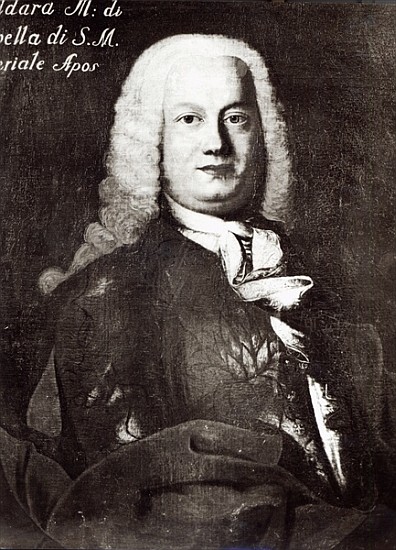
Antonio Caldara (1670 – 28/12/1736), 意大利巴洛克作曲家
/>
出生在意大利的威尼斯,去世于1736年12月28日。Antonio Caldara是当代最重要的作曲家之一,也是威尼斯著名大提琴演奏家,他被认为是一个非常天才歌手。他的出现给意大利18世纪初声乐演变带来了相当大的影响。
Caldara was born in Venice (exact date unknown), the son of a violinist. He became a chorister at St Mark's in Venice, where he learned several instruments, probably under the instruction of Giovanni Legrenzi. In 1699 he relocated to Mantua, where he became maestro di cappella to the inept Charles IV, Duke of Mantua, a pensionary of France with a French wife, who took the French side in the War of the Spanish Succession. Caldara removed from Mantua in 1707, after the French were expelled from Italy, then moved on to Barcelona as chamber composer to Charles VI of Austria, the pretender to the Spanish throne who kept a royal court at Barcelona. There, he wrote some operas that are the first Italian operas performed in Spain. He moved on to Rome, becoming maestro di cappella to Francesco Maria Marescotti Ruspoli, 1st Prince of Cerveteri. While there he wrote in 1710 La costanza in amor vince l'inganno (Faithfulness in Love Defeats Treachery) for the public theatre at Macerata. In 1716, he obtained a similar post in Vienna to serve the Imperial Court, and there he remained until his death.
Caldara is best known as a composer of operas, cantatas and oratorios. Several of his works have libretti by Metastasio.
Works:
- Maddalena ai piedi di Cristo (c. 1700)
- Santo Stefano, primo Re d'Ungheria (1713)
- La Conversione di Clodoveo Re di Francia (1715)
- La passione di Gesù Cristo (1730)[1]
- Il Re del dolore (1722)
- Stabat Mater (c. 1725)
- Others
- "Sebben, crudele" (Aria from La costanza in amor vince l'inganno, 1710)
- L'Olimpiade (Opera, 1733)
- D'improvviso (Cantata)
- "Pur dicesti, o bocca bella" (Aria)
- "Alma del core" (Aria)
- "Selve amiche" (Aria)